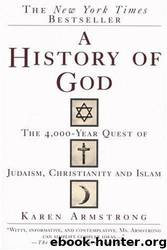A History of God: the 4000-year quest of Judaism, Christianity, and Islam by Karen Armstrong

Author:Karen Armstrong
Language: eng
Format: mobi, epub
Tags: Christian Rituals & Practice - General, Judaism - Doctrines - History, Religion, God (Christianity), Biblical teaching, God (Islam) - History of doctrines, God - History of doctrines, god, Comparative studies, God (Judaism), Faith, God (Judaism) - History of doctrines, Judaism, God - Biblical teaching, Islam - Doctrines - History, Religion - Commentaries, History of doctrines, History, Reference, Christian Rituals & Practice, General, Comparative Religion, God (Islam), Islam
ISBN: 9780345384560
Publisher: Random House, Inc.
Published: 1994-08-15T07:00:00+00:00
* * *
7 - The God of the Mystics
Judaism, Christianity and - to a lesser extent - Islam have all developed the idea of a personal God, so we tend to think that this ideal represents religion at its best. The personal God has helped monotheists to value the sacred and inalienable rights of the individual and to cultivate an appreciation of human personality. The Judaeo-Christian tradition has thus helped the West to acquire the liberal humanism it values so highly. These values were originally enshrined in a personal God who does everything that a human being does: he loves, judges, punishes, sees, hears, creates and destroys as we do. Yahweh began as a highly personalised deity with passionate human likes and dislikes. Later he became a symbol of transcendence, whose thoughts were not our thoughts and whose ways soared above our own as the heavens tower above the earth. The personal God reflects an important religious insight: that no supreme value can be less than human. Thus personalism has been an important and - for many - an indispensable stage of religious and moral development. The prophets of Israel attributed their own emotions and passions to God; Buddhists and Hindus had to include a personal devotion to avatars of the supreme reality. Christianity made a human person the centre of the religious life in a way that was unique in the history of religion: it took the personalism inherent in Judaism to an extreme. It may be that without some degree of this kind of identification and empathy, religion cannot take root.
Yet a personal God can become a grave liability. He can be a mere idol carved in our own image, a projection of our limited needs, fears and desires. We can assume that he loves what we love and hates what we hate, endorsing our prejudices instead of compelling us to transcend them. When he seems to fail to prevent a catastrophe or even to desire a tragedy, he can seem callous and cruel. A facile belief that a disaster is the will of God can make us accept things that are fundamentally unacceptable. The very fact that, as a person, God has a gender is also limiting: it means that the sexuality of half the human race is sacralised at the expense of the female and can lead to a neurotic and inadequate imbalance in human sexual mores. A personal God can be dangerous, therefore. Instead of pulling us beyond our limitations, 'he' can encourage us to remain complacently within them; 'he' can make us as cruel, callous, self-satisfied and partial as 'he' seems to be. Instead of inspiring the compassion that should characterise all advanced religion, 'he' can encourage us to judge, condemn and marginalise. It seems, therefore, that the idea of a personal God can only be a stage in our religious development. The world religions all seem to have recognised this danger and have sought to transcend the personal conception of supreme reality.
It is
Download
A History of God: the 4000-year quest of Judaism, Christianity, and Islam by Karen Armstrong.epub
This site does not store any files on its server. We only index and link to content provided by other sites. Please contact the content providers to delete copyright contents if any and email us, we'll remove relevant links or contents immediately.
| Buddhism | Christianity |
| Ethnic & Tribal | General |
| Hinduism | Islam |
| Judaism | New Age, Mythology & Occult |
| Religion, Politics & State |
Cecilia; Or, Memoirs of an Heiress — Volume 1 by Fanny Burney(32533)
Cecilia; Or, Memoirs of an Heiress — Volume 2 by Fanny Burney(31931)
Cecilia; Or, Memoirs of an Heiress — Volume 3 by Fanny Burney(31923)
The Secret History by Donna Tartt(19010)
Sapiens: A Brief History of Humankind by Yuval Noah Harari(14353)
Leonardo da Vinci by Walter Isaacson(13300)
The Radium Girls by Kate Moore(12007)
Sapiens by Yuval Noah Harari(5353)
How Democracies Die by Steven Levitsky & Daniel Ziblatt(5207)
The Wind in My Hair by Masih Alinejad(5084)
Homo Deus: A Brief History of Tomorrow by Yuval Noah Harari(4893)
Endurance: Shackleton's Incredible Voyage by Alfred Lansing(4747)
Man's Search for Meaning by Viktor Frankl(4561)
The Silk Roads by Peter Frankopan(4520)
Millionaire: The Philanderer, Gambler, and Duelist Who Invented Modern Finance by Janet Gleeson(4455)
The Rape of Nanking by Iris Chang(4193)
Joan of Arc by Mary Gordon(4087)
The Motorcycle Diaries by Ernesto Che Guevara(4078)
Stalin by Stephen Kotkin(3949)
